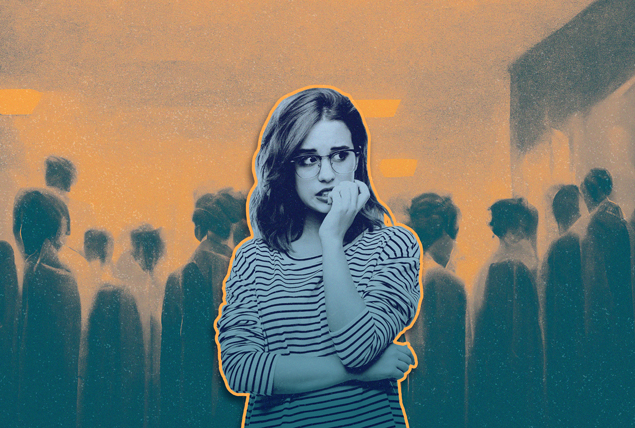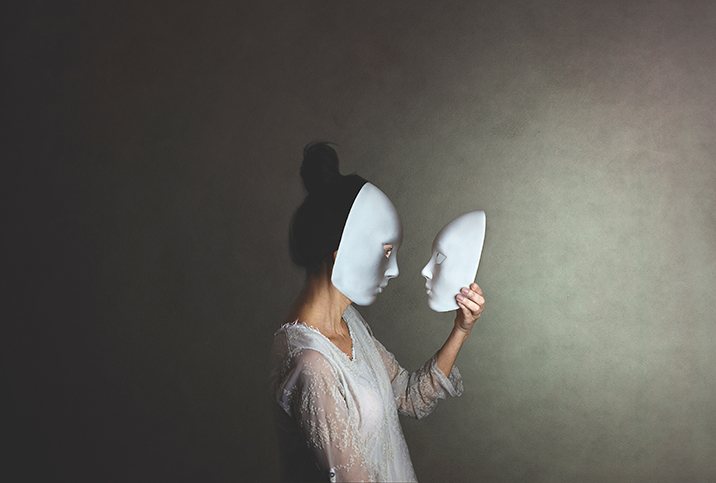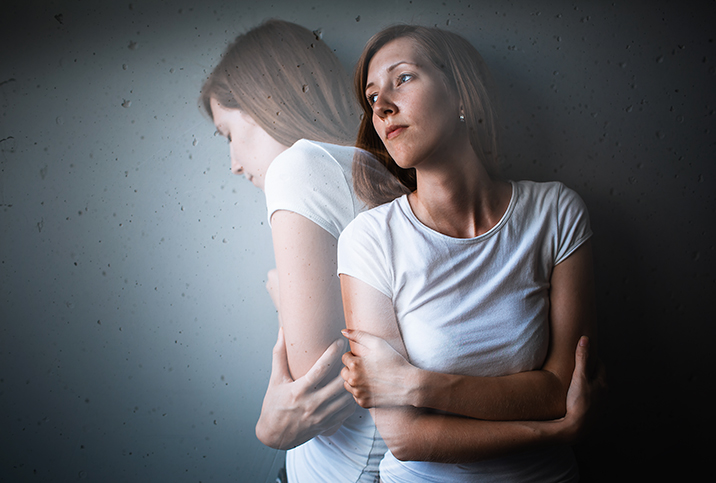How to Navigate a Relationship With Social Anxiety Disorder

Key Points
- People with social anxiety disorder can have a fear of vulnerability and rejection.
- Explaining your condition to your partner(s) can help educate them about what social anxiety feels like.
- Techniques such as deep breathing, mindfulness and grounding exercises can help you to relax and reconnect.
Living with social anxiety disorder (SAD) is challenging enough. Dating with social anxiety can feel like running uphill backward with a 50-pound backpack, fearing that if you stumble or stop for a second, your relationship will be over.
If you or your partner is among the 15 million socially anxious adults in the United States, here is expert advice to help you cultivate a healthier and happier union.
What is social anxiety disorder?
It's normal to feel anxious in certain social situations, like going on a first date or meeting your partner's parents for the first time. For people with SAD, however, that anxiety can be severe and unyielding.
Everyday interactions can be stressful and elicit anxiety, embarrassment and self-consciousness. All of these stem from the fear of being criticized by others, according to Gilza Fort-Martinez, M.S., L.M.F.T., the founder of Resolution Counseling Center in Miami.
"People with this condition tend to avoid social situations and can struggle to make and sustain relationships, particularly intimate ones," she said. "Often, people use self-isolation as a protective mechanism, but this only compounds anxiety and inhibits healing."
Other common symptoms are excessive worrying about rejection, difficulty with assertiveness and sensitivity to criticism.
"Social anxiety disorder can be best explained as living life with an imaginary spotlight on you 24/7, highlighting every interaction," said Jenna DiLossi, Psy.D., a clinical psychologist at Minding Your Mind, in Ardmore, Pennsylvania. "In addition to that spotlight, there is also an imaginary peanut gallery making commentary and forming judgments—possibly catastrophic judgments—about you based on each move within a social interaction or performance situation."
How can social anxiety affect romantic relationships?
Folks with SAD are generally less likely to be in relationships, according to a 2011 study. People with SAD who are partnered tend to report lower levels of relationship satisfaction and higher levels of sexual dysfunction, such as erectile dysfunction (ED) and difficulty achieving orgasm.
In part, this may be because people with social anxiety often have low self-esteem, which can make them feel unworthy of love and connection, said Clare Rosoman, Psy.D., a clinical psychologist in Brisbane, Australia, and the author of "Life After Love: An Emotionally Focused Guide to Relationship Loss."
"These worries are often underpinned by a fear of rejection and stem from a deep feeling of unlovability," she said. "Socially anxious people live their life in fear of being judged and rejected by others and become consumed with self-consciousness, seeing themselves through the eyes of a critical, faceless observer. As a result, it is difficult for them to let down their guard and to show up authentically in relationships."
The fear of vulnerability and potential rejection makes it difficult to form a new relationship and can inhibit emotional and physical intimacy, even in established partnerships.
"Usually, anxiety and sexual desire are unhappy bedfellows, with anxiety acting as a powerful brake for sexual desire in many people," Rosoman said.
A healthy and pleasurable sexual connection typically involves a sense of trust and comfort, and requires both parties to drop their guard, she added. It can be exceedingly difficult for people with SAD to reach a state of confidence and security. They may be preoccupied with pleasing their partner and "performing a role" to impress while suppressing their own needs or desires.
Recommended
- WTF Is Orgasm Anxiety?: You may be struggling to climax for a variety of reasons, but you can make behavioral changes.
- The Role of Anxiety in Erectile Dysfunction: How much does your state of mind shape your sexual health?
- What Is the Vagus Nerve Anyway?: These cranial nerves play a role in digestion, mood and heart rate—and your sexual health, too.
Social anxiety's effects aren't limited to the bedroom but can permeate multiple facets of a relationship, said Lyndsey Murray, M.S., L.P.C., a counselor at Relationship Matters Therapy and a podcast host at "Sex Positivity: Unfiltered," in Hurst, Texas.
"If a socially anxious person suppresses their emotions and important aspects of themselves, a partner may interpret them as aloof or disinterested," she said. "Some may feel deceived."
Additionally, folks with SAD tend to be constantly on the lookout for criticism or judgment, including from partners. This can spur unnecessary conflict and a vicious cycle of miscommunication, stress, defensiveness, and a sense of hopelessness and defeat.
How can a socially anxious person communicate their needs?
Though it seems a monumental feat for someone with SAD, communicating honestly and openly is crucial for a relationship to thrive, particularly where social anxiety is involved.
"If you don't clue your partner into your social anxiety, it might start to appear that you don't like doing things with them or that you hate spending time with their friends when really group situations just make you nervous," said Allison Raskin, a mental health advocate with a master's degree in psychology and the founder of the "Emotional Support Lady Substack." "Sometimes, social anxiety can come off as rudeness because the person can't be comfortable and friendly around new people.
"Your partner might just think you are constantly in a bad mood in social situations when really you are fighting your brain. Your partner can't empathize with your struggle if they don't know you are struggling."
"It can be tough to explain what social anxiety feels like—and how it affects you—to someone who doesn't have it, so it may be helpful to write down what you'd like to say first," Murray said.
Know that social anxiety disorder isn't a personal problem but a legitimate disorder that affects many people. Some other key points to consider include the following:
- Has anything helped in the past?
- How do you feel about your anxiety? For example, do you recognize it's irrational or genuinely believe everyone is judging you?
- What does social anxiety feel like for you?
- What kinds of thoughts go through your brain?
- What's the root cause of social anxiety for you?
- When is it most prevalent?
How can you make it easier to date with social anxiety?
While your partner's understanding is important, it's also essential to find ways to alleviate your anxiety. Experts recommend at least four ways to do that.
1. Question negative automatic thoughts
"Catch yourself assuming that others are looking at you in critical or judgmental ways and name this as a protective part of you that's trying to keep you safe," Rosoman said. "This protective part thinks it's looking out for you, but it is actually getting in the way of you being authentic. Thank it for trying to keep you safe and release it from its burden. You've got this."
If these negative thoughts arise when you're with your partner, remind yourself that you're worthy and clue them in so they can reassure you, she added.
The Sexual Health Survival Kit for Women: Prepare yourself for all the twists and turns you may face in your sex life. Who knows when you may receive an appealing invitation from a sexual partner or when troubling symptoms could strike?
2. Be strategic
All relationships require compromise. Talk to your partner and learn each other's priorities, and then establish a plan to ensure both of your needs are met. For example, you might choose to attend the social events most important to your partner while skipping others, Fort-Martinez explained. This can help prevent feelings of being overwhelmed and give you time and space to prepare.
Also, Raskin recommended trying dates that aren't socially centered. Go for a hike or see a movie so your anxiety isn't a dominant factor whenever you leave the house.
3. Practice relaxation techniques
With anxiety, the nervous system is dysregulated and in a constant state of fight-or-flight. Techniques such as deep breathing, mindfulness, and grounding exercises can help you to relax and reconnect with the present moment to reduce stress and prevent spiraling, according to Fort-Martinez.
Physical exercise, meditation and yoga also can help to alleviate anxiety.
4. Find outside support
"If your partner is your only social support, that can be a lot of pressure on the relationship," Fort-Martinez said.
Fostering friendships and participating in a hobby or volunteer group can help to broaden your sense of belonging and inclusion, she added. SAD support groups can be beneficial, too, as can seeking support from a mental health professional.
"There's no need to suffer in silence and alone," she said. "Therapy and sometimes medication can be very helpful."
What if you're the one dating someone with social anxiety?
"Being in a relationship with a socially anxious person can be frustrating as they tend to overshare negative thoughts, be clingy or restrain from sharing their thoughts at all," Fort-Martinez said. "While these [obstacles] can be burdensome, remember that your partner is not choosing to do or be this way. They are suffering and would quickly change if it were easy to do so."
Try these four ways to support your partner.
1. Get familiar with social anxiety
"Educate yourself on what the experience of social anxiety disorder feels like to those who struggle," DiLossi said. "For those who are socially confident and take possible judgment in stride, the fears in social anxiety may seem silly and unrelatable. Know that these fears are quite debilitating to your loved one."
Information is power, Fort-Martinez noted.
"Learning what social anxiety is and is not, how it develops, and potential coping strategies can help you understand and show up for your partner," she said.
2. Give them space
When a socially anxious person is feeling overwhelmed or drained, they may start to shut down, Murray explained. Rather than shut down with them, allow them the space to self-regulate and return when they're ready.
"A socially anxious person needs solo time to recharge," Fort-Martinez said. "Reassure them that you understand that taking that time is OK and helpful for the relationship."
3. Learn about exposure therapy
Exposure therapy is a type of cognitive behavioral therapy (CBT) that gradually introduces people to things or circumstances they find stressful to help them overcome their fears. Understanding the principles of this and why it's important can help you avoid common pitfalls, according to DiLossi.
"It may feel tempting to handle social situations or logistics for your partner because you love them and want to make their lives easier," DiLossi said.
She used the example of ordering a drink for your girlfriend because you think she is afraid of sounding stupid to the bartender.
"It's important to know that this inhibits their ability to learn and refine skills in addition to testing hypotheses about what they fear may happen," she said. "It also inadvertently communicates, 'you can't handle this,' which is the opposite of what we want to communicate."
4. Communicate kindly and clearly
When dating someone with social anxiety disorder, do not dismiss their concerns or take their behavior personally. Approaching challenges with empathy rather than criticism is best for both of you, Raskin said.
"Be kind in expressing your expectations but communicate them clearly. Let them know how their behavior impacts you and the relationship," Fort-Martinez said.
She recommended you say something like, "I would like you to take a breath as you talk to me about what's bothering you" instead of 'You make me crazy with all your complaining."
"Kindness can go a long way in helping your partner hear what you're saying and listen. Patience is necessary," Fort-Martinez said.
The bottom line
Navigating social anxiety disorder in a relationship can be tumultuous; however, working through issues together can facilitate healing and foster intimacy.
"The main thing is that 'problematizing' anxiety usually makes it worse—whether anxiety is showing up in emotionally or sexually intimate contexts," Rosoman said. "The more you can accept each other's raw spots and meet them with kindness and compassion, the stronger your bond becomes, and the rawness within each partner eases."


















